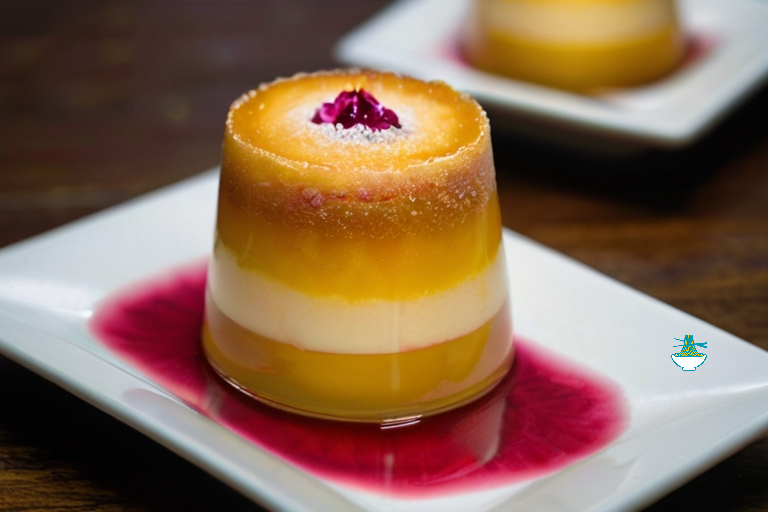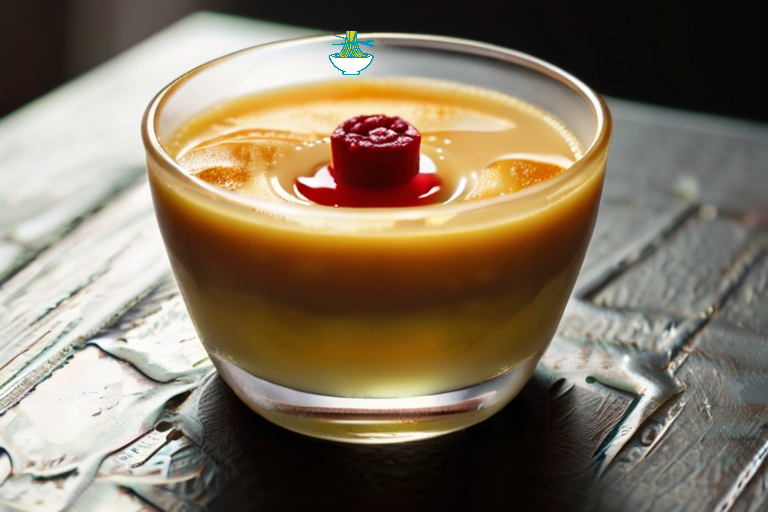Indulge in the rich heritage of Croatian cuisine with Rozata, a sumptuous dessert hailing from the ancient city of Dubrovnik. Known for its charming blend of Mediterranean and Balkan flavors, Dubrovnik offers a culinary journey like no other, and Rozata stands as a testament to its delectable offerings.

Rozata, often referred to as the Croatian version of crème caramel or flan, entices with its smooth, velvety texture and a subtle infusion of local aromas. This dessert is crafted from a heavenly mixture of creamy milk, eggs, sugar, and a hint of fragrant rose liqueur or citrus zest, creating a harmony of flavors that dance on the palate.
Traditionally prepared in a rounded mold and gently baked to perfection, Rozata emerges with a tantalizing caramelized layer on top, promising a delightful contrast of textures with every spoonful. Its elegant presentation reflects the sophisticated charm of Dubrovnik, inviting you to savor each bite amidst the picturesque backdrop of the Adriatic coast.
Whether enjoyed as a sweet finale to a traditional Dalmatian feast or savored on its own as a blissful indulgence, Rozata captures the essence of Dubrovnik's culinary heritage, leaving a lasting impression on discerning palates and offering a taste of the city's timeless allure.

Here's a recipe for Croatia Dubrovnik Rozata:
Ingredients:
- 4 large eggs
- 1 cup granulated sugar
- 2 cups whole milk
- 1/2 cup heavy cream
- 1 teaspoon vanilla extract
- 1 tablespoon rose liqueur (such as rose brandy or rose water)
- Zest of 1 lemon or orange
- Pinch of salt
- Additional sugar for caramelizing
Instructions:
1- Preheat your oven to 350°F (175°C). Prepare a large baking dish and a round mold or individual ramekins.
2- In a mixing bowl, whisk together the eggs and sugar until well combined and slightly pale in color.
3- In a saucepan, heat the milk and heavy cream over medium heat until it just begins to simmer. Remove from heat and stir in the vanilla extract, rose liqueur, lemon or orange zest, and a pinch of salt.
4- Slowly pour the warm milk mixture into the egg mixture, whisking constantly to prevent the eggs from scrambling.
5- Strain the mixture through a fine-mesh sieve to ensure a smooth texture.
6- Pour the custard mixture into the round mold or individual ramekins, filling them about 3/4 full.
7- Place the filled mold or ramekins into the baking dish. Carefully pour hot water into the baking dish, surrounding the molds or ramekins to create a water bath (bain-marie).
8- Bake in the preheated oven for about 40-45 minutes, or until the custard is set but still slightly jiggly in the center.
9- Remove the baking dish from the oven and let the Rozata cool to room temperature. Then, transfer it to the refrigerator and chill for at least 2 hours, or overnight, to allow it to fully set.
10- Once the Rozata is chilled, run a knife around the edges of the mold or ramekins to loosen the custard. Place a serving plate upside down over the mold or ramekin, then quickly and carefully invert it to release the custard onto the plate.
11- Just before serving, sprinkle a thin layer of granulated sugar evenly over the top of the custard. Use a kitchen torch to caramelize the sugar until it forms a golden-brown crust.
12- Serve the Croatia Dubrovnik Rozata chilled, garnished with fresh berries or a sprig of mint, if desired. Enjoy this delightful custard pudding with its unique flavors of rose liqueur and caramelized sugar!
Nutritional Values:
Here are the approximate nutritional values for the ingredients used in the Croatia Dubrovnik Rozata recipe, per serving (assuming the recipe serves 4):
Eggs (1 large):
- Calories: 70
- Protein: 6g
- Fat: 5g
- Carbohydrates: 0.6g
- Cholesterol: 186mg
- Sodium: 70mg
benefits:
- Rich source of high-quality protein.
- Contains essential vitamins and minerals like vitamin B12, riboflavin, and selenium.
- Provides choline, which is important for brain health.
Granulated Sugar (1 cup):
- Calories: 774
- Carbohydrates: 200g
benefits:
- Provides quick energy due to its high carbohydrate content.
- Adds sweetness and flavor to the dessert.
- Enhances texture and structure when mixed with other ingredients.
Whole Milk (2 cups):
- Calories: 296
- Protein: 16g
- Fat: 16g
- Carbohydrates: 24g
- Cholesterol: 52mg
- Sodium: 210mg
benefits:
- Excellent source of calcium, which is essential for strong bones and teeth.
- Provides protein for muscle growth and repair.
- Contains vitamins D and B12, important for overall health and energy metabolism.
Heavy Cream (1/2 cup):
- Calories: 400
- Protein: 3g
- Fat: 44g
- Carbohydrates: 3g
- Cholesterol: 163mg
- Sodium: 40mg
benefits:
- Adds richness and creaminess to the dessert.
- Source of healthy fats, which provide satiety and energy.
- Contains fat-soluble vitamins like vitamin A, important for vision and immune function.
Vanilla Extract (1 teaspoon):
- Calories: 12
- Carbohydrates: 0.5g
benefits:
- Enhances flavor and aroma of the dessert.
- May have antioxidant properties.
- Adds a hint of sweetness without increasing sugar content significantly.
Rose Liqueur (1 tablespoon):
- Calories: 59
- Carbohydrates: 3g
benefits:
- Adds a unique floral flavor to the dessert.
- Provides a subtle fragrance that enhances the overall experience.
- Can have calming and relaxing effects when consumed in moderation.
Lemon or Orange Zest (1 citrus fruit):
- Calories: 5
- Carbohydrates: 1.5g
benefits:
- Adds bright, citrusy flavor to the dessert.
- Contains vitamin C, which supports immune function and skin health.
- Provides antioxidants that help combat free radicals in the body.
Salt (Pinch):
- Calories: 0
- Sodium: Varies
benefits:
- Enhances flavor and balances sweetness.
- Helps regulate fluid balance and nerve function in the body.
- Necessary for proper muscle and nerve function.
Additional Sugar for Caramelizing (1 tablespoon):
- Calories: 49
- Carbohydrates: 12g
benefits:
- Creates a crisp, caramelized crust on top of the dessert.
- Adds sweetness and visual appeal.
- Provides quick energy when consumed.
Please note that these values are approximate and can vary based on factors such as brand, exact measurements, and specific ingredients used.


Comments